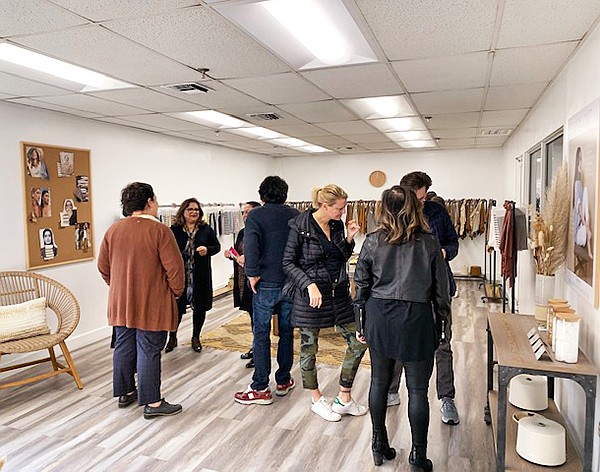TEXTILES
An Intimate Approach at Studio DK Affords Opportunities to Emerging Designers
Reaching success as a designer in the apparel business can be a challenging task, particularly when faced with supply-chain partners that cannot accommodate the smaller business model that allows aspiring clothing makers to start. There has been a slowly growing segment of mills and manufacturers that are creating spaces for these designers to thrive. One of those is the Los Angeles–based Design Knit, a fabric mill that launched its Studio DK line in July.
“This is still under the Design Knit umbrella, but Studio DK was created to be a space for young brands to have a beautiful selection of fabrics to choose from, and the collection is growing seasonally as well,” said Pat Tabassi, product development and marketing manager of the 34-year-old family-owned business. “Currently we have about 400 styles, and it’s continuing to grow.”
Since the July launch, the new segment of the business has added styles in addition to its 15 core offerings. The company works with designers to offer flexible roll-count options While most products are considered novelty and would include a surcharge, orders for the foundation textiles are considered stock items that are available without the additional cost.
“Basically it’s a great space where they can come in and feel inspired because we’ve garment-dyed samples. You come in for a private appointment, and it’s not as hectic as a trade show,” Tabassi said. “Most goods are made to order, but the lead time for the core pieces is quicker.”
To celebrate the dedication of a portion of the Design Knit building that is now reserved for Studio DK, the company hosted an event with fiber partner Lenzing on Jan. 15. For Studio DK customers who are emerging designers or smaller fashion houses, the new space affords a sourcing experience that not only suits their needs in an environment where they can feel as important as larger brands but also affords opportunities they might not otherwise have.
“The goal is to grow together. We do a lot of mentorships and offer tours to the local fashion schools, which we’ve been doing for years,” Tabassi said. “Through my interaction with students and young designers, I’ve discovered they have a really hard time finding a place to source fabrics consistently. They could find closeouts or one-off goods, but, if they establish themselves, they can’t re-create a collection or core pieces.”
With growing awareness among next-generation designers, additional challenges arise when these artists wish to create collections that are based on responsible sourcing, yet the costs associated with eco-friendly textiles and production are often high. When faced with unrealistic costs of sustainable sourcing, designers might be prevented from bringing their visions to life.
For Kristen Gonzalez co-founder of Selva Negra, a four-year-old Los Angeles-made high-fashion brand that celebrates Latinx culture, working with Studio DK affords a family environment and has allowed her brand to grow without facing financially debilitating prices typically associated with eco-friendly textiles.
“It has definitely boosted our business because we are able to have luxury fabric without breaking the bank,” she explained. “Studio DK is great because they work with small production runs and low minimums without compromising on materials. It’s important, especially as a self-funded business.”
Echoing this sentiment, Becky Patel, who started her yoga-apparel business Ame Yoga in 2018, says that working with Studio DK allows the designer to create locally made goods through a supply chain that is completely based in Los Angeles.
“Because our business is so small, I’m not able to buy large quantities of fabric and compete with big yoga-clothing brands,” she said. “Working with Studio DK allows me to buy smaller quantities of gorgeous fabrics and try new designs without a huge investment. It gives me flexibility with designs and I love that our whole garment, including fabric, is made here in L.A.”
To help alleviate these challenges, Studio DK partnered with Austria-headquartered fiber provider Lenzing. By incorporating fabrics created with Lenzing’s Refibra technology, Studio DK is able to provide textiles made from upcycled pre-consumer cotton waste and wood pulp that creates Tencel Lyocell RB eco-friendlier textile options for designers who wish to make more-sustainable manufacturing a part of their stories from the beginning.
“We are getting inquiries [for sustainable products], and many are from emerging designers,” said Sharon Pérez, business development manager of activewear at Lenzing. “There is such a huge demand. With a concept like Studio DK, I can now point them in this direction to grow the business together. Everyone has to start somewhere. We don’t ignore these emerging and smaller designers.”
In addition to offering ecologically sound materials to designers, Pérez noted local manufacturing as another trend that is connected to creating a greener supply chain.
“It made sense to work together to promote the new fiber. It’s being made here in L.A., which is a growing topic more and more—producing locally,” she said. “Design Knit has been such a long-term partner for [our] fibers. They were eager to work with Refibra and quickly turn it around to make this collection.”
Creating a space to inspire designers is only part of the Studio DK mission. As more newcomers enter the fashion-design space, Tabassi recognizes opportunities to connect designers with other supply-chain partners whose willingness to work with these creatives at a lower cost is crucial.
“We’ve been meeting with cut-and-sew facilities, so we’ve been helping to connect them. It’s more of an introduction. Having a better understanding of how they work, we can help designers decide on the right fit, and they take it from there,” she said. “It helps the supply chain grow.”
RELATED STORIES
- Lenzing and Hyosung to Launch Sustainable Collection at ISPO Munich
- From Farm to Factory, Fibershed Pushes the Industry Toward Responsible Fiber Sourcing
- More Than a Trend, the Search for Sustainable Materials Brings Buyers to LA Textile
- L.A. Designer Pawan Kumar and Lenzing to Debut Midnight Blues at Kingpins






















